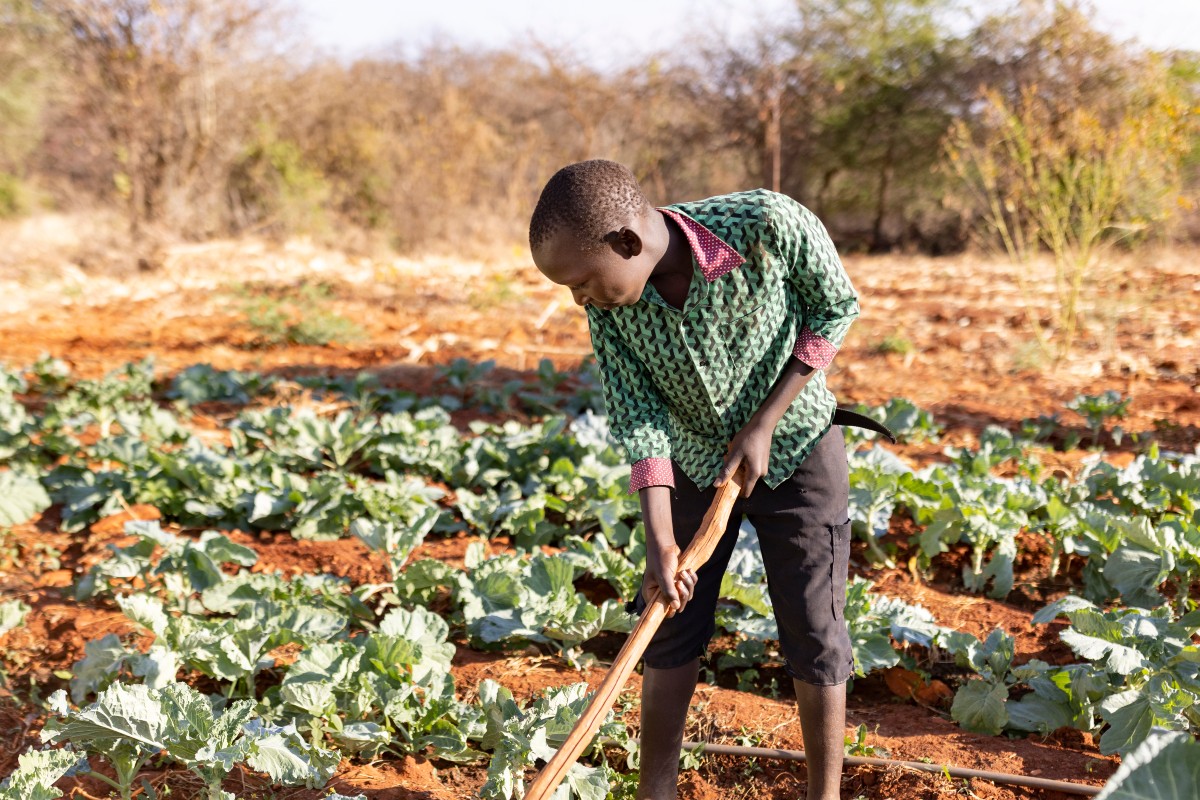
Chege Ngugi

David (12) farms in his family’s collard greens field in Embu County, the seeds and irrigation system were given to his family through ChildFund.
Empower smallholder farmers for food security
Africa is a continent of great paradox. Despite having nearly 60 percent of the world’s most fertile lands, we have, for many years, been unable to feed ourselves. Our governments spend billions annually importing food items. For example, Russia and Ukraine provide over 40% of our wheat supply in Kenya. With roughly 600 million hectares of arable land, why can’t we grow our own food? Why do we constantly grapple with high levels of food insecurity, hunger, and malnutrition?
The key to unlocking Africa’s ability to feed itself lies in empowering smallholder farmers to harness the power of technology and adopt climate-smart agricultural practices. Smallholder farmers, who typically farm on less than a hectare of land, are the backbone of our food production systems. Africa is home to an estimated 33 million such farmers who contribute up to 70 percent of our food supply.
Unfortunately, just like many other entities, smallholder farmers are disproportionately affected by climate change, with severe droughts, floods, and supply chain disruptions. Even worse, they are often overlooked when governments and other giant corporations start talking big about combating food insecurity through large-scale farming. In the recent past, the focus on large-scale agriculture focusing on export crops like coffee, tea, cocoa, and now, avocado, seems to have overshadowed the potential of smallholder farmers. Usually, the only time I hear these farmers mentioned, especially by governments, is when the latter gives out subsidized fertilizer. While this is commendable, it is not enough.
One of the biggest challenges facing our farmers is overreliance on rain-fed agriculture. 95% of agriculture in Africa relies on rainfall for water. But where is the rain? With rainfall projected to decrease in many parts of the continent and the frequent occurrence of droughts, farmers living in dry regions are already struggling to find enough water for their crops. The World Bank notes that by 2100 the availability of water in all of Africa could decline by more than 10%.
As the saying goes, insanity is doing the same thing over and over again and expecting different results. Given the dwindling water resources, if we expect our farmers to till their land every day, using the same old traditional tools, and sit and wait for the rains, just like their ancestors did, then we are doomed and bound to continue suffering hunger and malnutrition perpetuating the begging and dependency syndrome.
Africa’s agricultural system must respond to climate change. We must support our farmers to integrate technology into farming and embrace climate-smart agricultural practices that will enable them to farm with minimal water resources.
Recent discussions at COP28 in Dubai highlighted the importance of transforming food systems for climate-affected communities, with a focus on smallholder farmers. Notably, ChildFund and a Swedish green tech innovator, Spowdi, signed an agreement to introduce smart farming technologies to tens of thousands of small-hold farmers in Africa. The initiative includes providing equipment and training on smart irrigation technology, specifically Spowdi’s solar-powered, mobile water distribution systems. These technologies aim to enhance food production while using minimal water resources. The pilot project in Kenya will be expanded to other African countries, including Uganda, Ethiopia, Zambia, Mozambique, Guinea, Senegal, Sierra Leone, and The Gambia.
Spowdi and ChildFund will also establish demonstration sites, testbeds, and training hubs for farmers, trainers, distributors, educationists, and other partners.
According to a study published in the Journal of Agricultural Science and Technology, smart irrigation technologies can result in water savings of up to 50%. In addition, the Intergovernmental Panel on Climate Change (IPCC) reports that climate-smart agriculture practices contribute to increased resilience, reducing the vulnerability of agriculture to climate change.
Harnessing the potential of such innovative solutions will contribute to increased productivity, sustainability, and resilience and enable us to meet our domestic food demands. By providing farmers with the tools and knowledge needed to adapt to a changing climate, we can create a more sustainable, resilient, and food-secure future for our continent. The investment in climate-smart agriculture is not just an investment in agriculture; it is an investment in the well-being and prosperity of communities.
As we strive for a more sustainable future, empowering smallholder farmers becomes not only a necessity but a pathway to realizing the full agricultural potential of the continent.
Africa can indeed feed Africa, but this vision requires a concerted effort that transcends sectors and demands that all stakeholders – farmers, governments, donors, innovators, civil society organizations, private sector, research and academic institutions – rally around a shared goal – one where no African child goes to bed hungry.
This oped was first published by the Daily Nation




